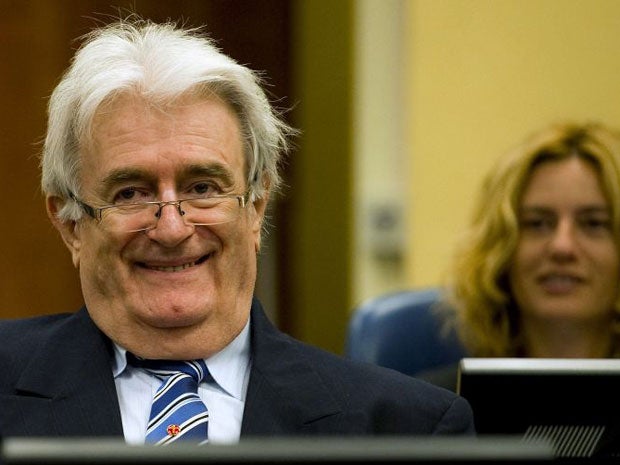Your support helps us to tell the story
From reproductive rights to climate change to Big Tech, The Independent is on the ground when the story is developing. Whether it's investigating the financials of Elon Musk's pro-Trump PAC or producing our latest documentary, 'The A Word', which shines a light on the American women fighting for reproductive rights, we know how important it is to parse out the facts from the messaging.
At such a critical moment in US history, we need reporters on the ground. Your donation allows us to keep sending journalists to speak to both sides of the story.
The Independent is trusted by Americans across the entire political spectrum. And unlike many other quality news outlets, we choose not to lock Americans out of our reporting and analysis with paywalls. We believe quality journalism should be available to everyone, paid for by those who can afford it.
Your support makes all the difference.Former Bosnian Serb leader Radovan Karadzic claimed he was a peace-lover as he addressed his trial for crimes against humanity today.
He cast himself as a "mild man, a tolerant man" who tried to prevent war and then worked to reduce casualties on all sides in the bloody 1992-95 Bosnian conflict, as he opened his defence in his long-running genocide trial.
His claims brought snorts of derision and cries of, "He's lying! He's lying!" from Muslim survivors of the war watching from the public gallery at the court in The Hague.
Karadzic was given 90 minutes to make a statement on his role in the war that left an estimated 100,000 dead. The statement was not made under oath, meaning he could not be cross-examined by prosecutors.
In another of the tribunal's courts, Goran Hadzic, a former leader of rebel Serbs in Croatia, became the last of the tribunal's 161 indicted suspects to face justice as his trial got under way.
He was arrested last year in northern Serbia after more than seven years on the run and pleaded not guilty to charges of murdering hundreds of Croats and expelling tens of thousands more.
Karadzic, a former psychologist and poet, told judges he was a "physician and literary man" who was a reluctant player in the violent break-up of Yugoslavia.
"Instead of being accused of the events in our war, I should be rewarded for all the good things I have done," he said through a court interpreter. "I did everything humanly possible to avoid the war ... I succeeded in reducing the suffering of all civilians."
Prosecutors have painted a starkly different picture of Karadzic during months of witness evidence, portraying him as a political leader who masterminded Serb atrocities throughout the war, from campaigns of persecution and murder of Muslims and Croats early in 1992 to the conflict's bloody climax, the 1995 massacre of some 8,000 Muslim men and boys in the UN-protected Srebrenica enclave.
Karadzic, 67, denied that portrait of him.
"Everybody who knows me knows I am not an autocrat, I am not aggressive, I am not intolerant," he told judges. "On the contrary, I am a mild man, a tolerant man with great capacity to understand others."
Karadzic boycotted the start of his trial in October 2009 saying he had not been given enough time to prepare. The first witness did not appear until April 2010 and prosecutors rested their case on May 25 this year.
Just over a month later, judges acquitted Karadzic of one count of genocide, saying prosecutors had not presented enough evidence to establish that a campaign of murder and persecution early in the Bosnian War amounted to genocide. Prosecutors have appealed the acquittal.
Karadzic still faces 10 more charges, including one genocide count relating to the Srebrenica massacre.
His wartime military chief, Ratko Mladic, is also on trial in The Hague, facing the same charges. Both men face a maximum sentence of life imprisonment if convicted.
PA

Join our commenting forum
Join thought-provoking conversations, follow other Independent readers and see their replies
0Comments